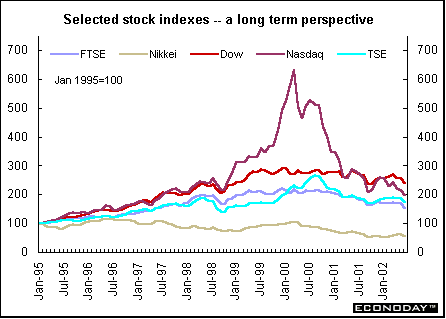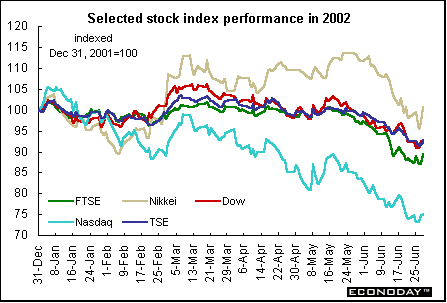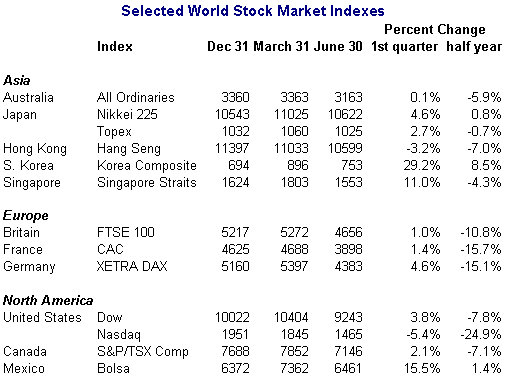| ||||||||||||
|
| ||||||||||||
![[Back To Archive]](../../../images/backtoarchive.gif)
| ||||||||||||
 | |||||||||||||
An abysmal performance No one is sorry to see the second quarter of 2002 fade into history. With it came new short-term lows for global equities comparable to those seen after the September 11 terrorist attacks. Investors, already dealing with scary geopolitical and terrorism issues, were pushed over the edge by the uninterrupted barrage of corporate malfeasance. Now investors don’t trust any news, even if it is good. With suspicion lurking around every corner, investors can only dream of a return to pre-millennium days and double-digit returns. Stepping back to the long-term, the graph below shows the Nasdaq suffering greater fluctuations than the Dow Industrials, Nikkei, London FTSE or Toronto S&P/TSX composite.  The dollar matters Global stock performance, or the lack of, shows some correlation to the slumping value of the dollar. If the dollar is falling because U.S. investments, especially equities, are so unappealing, where are investors putting their money? Certainly not in stocks in Europe, Britain or Japan! Stocks there are being hammered as well. Not only do offending companies get pummeled, but companies that share the same sector get roughed up as well. The dollar has been following the equities markets for the most part as investors overseas — and those in the United States — take a dim view of economic growth and corporate shenanigans. The dollar has lost over 11 percent against the euro and 8.5 percent against the yen since the first of the year. Is it a case of selling U.S. assets without re-investing the proceeds back home? Being overlooked by market players are economic growth prospects. Europe is lagging the United States in growth, while growth is questionable altogether in Japan. Until recently, the United States could do no wrong. Now the slightest change in the U.S. outlook is an excuse to sell. Theoretically, a strong euro should mean investors elsewhere in the world (but mostly the United States) would start buying eurozone stocks, sending prices up. In practice, U.S. Treasury statistics show that Americans continue to be net sellers of European equities. U.S. investors may be disenchanted with their own companies, but they aren't in love with European ones either. Many analysts believe that U.S. investors tend to look for growth opportunities, which have traditionally been found at home and not in overseas markets. Nor can a rising euro be expected to improve profits of European companies. Many European companies have been exporting as much as they can to the United States and have become heavily dependent on these sales. It is estimated that dollar-related revenues account for 30 percent of corporate Europe's income.  Where/when will it end? First there was Enronitis. That was followed by Tycosis. At second-quarter’s end, we have yet more blockbuster corporate malfeasance — WorldCom (with a little Xerox on the side). Bad news and uncertainty have always rattled investor confidence. The table below gives the dismal statistics for the first half of 2002.  In Britain, the FTSE 100’s first-quarter gain turned into a first-half loss to the tune of 10.8 percent. Directional changes in indexes tend to be influenced by the trading direction of U.S. stocks. The London FTSE 100, Paris CAC and Frankfurt DAX swooned in May and June as they continued to track the U.S.'s ups and downs. The Frankfurt DAX, which was also on the plus side at the end of the first quarter, reversed direction to lose 15.1 percent by June 30. The Paris CAC extended its downward trend of the first quarter and closed out the first half of the year with a loss of 15.7 percent. Contributing to the declines was overall anemic economic performance in Europe. Whatever growth occurred came essentially from exports. And even though analysts think that U.S. growth slowed in the second quarter from the unsustainable pace of the first quarter, the European outlook still lags that of the United States by a considerable margin. Most Asian indexes followed here did not suffer the reversals that occurred in Europe, Canada and the United States. The hero in Asia remains the South Korean Kospi, although it was not immune to the downward slide in global stocks. The index still managed to be up 7.1 percent at second-quarter’s end. However, this compares unfavorably to the heady 32.3 percent gain that the Kospi recorded at the end of the first quarter. The Nikkei has given back most of the appreciation that occurred prior the close of the Japanese fiscal year on March 31. Although the Nikkei barely had its head above water, up 0.8 percent at the end of June, it had lost most of its 7.5 percent first-quarter rise. Ironically, the Nikkei outperformed U.S. and European indexes primarily because of strong exports to the United States and a favorable exchange rate. In the Americas, investors’ confidence, which was edgy already because of political and terrorist uncertainties, has been severely eroded by the continual onslaught of corporate travesties. Doubts about accounting U.S. style have made investors very skeptical of any earnings statement. Now, only the Mexican Bolsa stands — just barely — above year-end levels. The bursting of the technology and telecommunications bubble has pushed the Nasdaq down to ever-lower levels. It has now lost 24.9 percent when compared against year-end 2001. The Dow and the Toronto S&P/TSX composite have dropped 7.8 percent and 7.1 percent respectively. Stocks continue to be brutally punished at each new corporate revelation. Bottom line Worldwide equities for the most part have been declining for 2½ years and counting. Traditionally, a rise in equities precedes economic recoveries by about six months. But not this time. Recent declines have been in the face of an improving U.S. and world economy. Investor woes can be blamed on the hubris of corporations and accounting firms, the outbreak of hostilities in the Middle East, the always threatening situation in near Asia, terrorist threats, etc. But uppermost is the continuing stream of bad news from corporations that continue to amaze. For investors to recover their equilibrium it is clear that a corporate cleansing needs to take place. | |||||||||||||